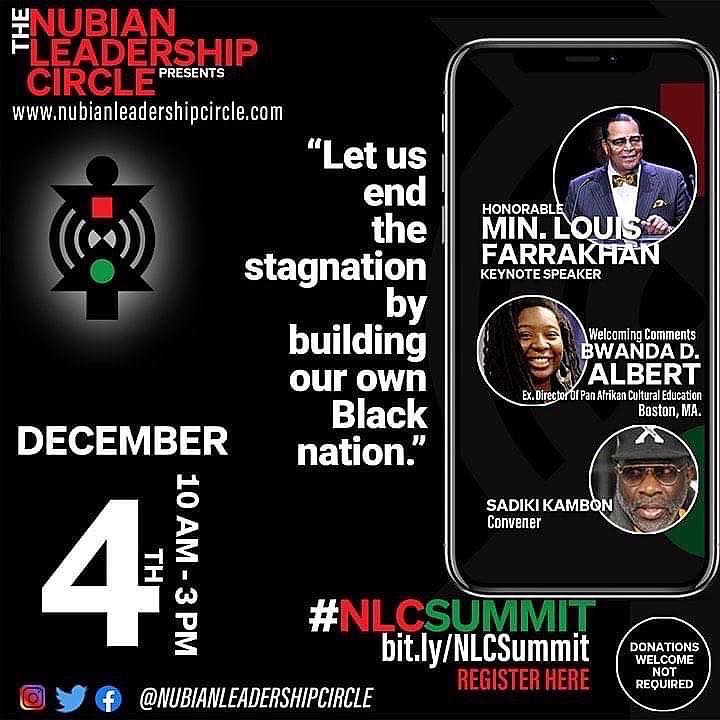The Nubian Leadership Circle hosted its 4th virtual summit in early December, under the theme “Let Us End the Stagnation by Building Our Own Black Nation.” Summit convenor Sadiki Kambon described how the summit’s focus is action and the Honorable Minister Louis Farrakhan of the Nation of Islam delivered closing remarks.
The Nubian Leadership Circle is on an ambitious mission to organize and mobilize Black leadership at the local, national, and international levels. The goal is facilitating operational unity that results in bettering Black lives and building a Black nation.
While similar to the National African American Leadership Summit, a 1990s initiative that brought leaders together around common issues and Black survival through nationwide leadership meetings, the NLC focuses on grassroots individuals and organizations determined to create a new, independent reality.
The Nubian Leadership Circle is based on the concept of operational unity, recognizing that there are a wide range of organizations within the national and international Black community with diverse ideologies and methods of approach.
There were several cadres (work groups) dedicated to nation building: Health and Education, Communication and Technology, Arts and Culture, Family Essence, Land and Food, and International Advocacy. Each workshop delved into aspects of current conditions Black people face and how developing independence through unity, Black people can become healthy and whole again.

The facilitators of the Spiritual Renewal cadre were Student Minister Rodney Muhammad and his wife Lisa Muhammad of Cambridge, Mass. This cadre addressed Black organizations and churches creating committees, if they don’t already have them, to come up with an action plan and spiritual base that will make Black communities safe. They also talked about the importance of having a prayer line.
“Prayer is essential, without God at the center of our lives, we’re done, we’re finished. God is Number 1, with Him we put our guns down and we pick up our God,” stated Rodney Muhammad. Spirituality and the renewal of spirituality in a time of slavery, which is still alive and well as we speak, is vital, he said.
Lisa Muhammad added, “This is spiritual warfare. It’s not about a gun. They’re trying to break our spirit, even during covid. Loss of income, loss of life, these are things that we need to make sure that we cheer one another up. Let people know that they’re not alone.”
Facilitating the Economic Development cadre were Dr. Ray Winbush and Adrian Hickman. Key plan of action points this cadre shared were land ownership and creating a national Black business directory.
“We discussed cryptocurrency and ways to invest and learn from our youth to be able to try to learn the basics of technology as we’re moving into the digital age,” explained Mr. Hickman.
Dr. Winbush said, “We’re reminded of the ‘60s expression, think globally and act locally. We’re going to be creating Black spaces that are specifically for Black nationalists and Pan Africanism to keep all the projects for us.”
Dr. Zenobia Day and Thabiti Umoja facilitated the Health and Education cadre. Natural holistic care was the focal point of this work group, in which overall health was discussed, as well as the current Covid-19 pandemic.
Mr. Umoja reiterated the need for self-responsibility and things to do to improve individual health. What types of things can be done to keep immune systems strong? Exercise, get appropriate sleep, and proper nutrition, he said.
“We were talking about the importance of Black doctors needing to realize that they’re Black, first, so that they can actually help our people. There’s Black research groups such as the Black Health Collective that I’m a part of. That’s really needed,” added Mr. Umoja. Dr. Day added, “We did go into the medical history and the pharmaceutical impact in the medical industry. We have to understand some of the history to understand where we’re going.”
Akilah Witherspoon facilitated the Technology and Communications cadre. “We had a really informative session and a lot of information came from that. We also identified a lot of talent that is available for our technology needs. We need people with the skill set to build what we’re trying to do, such as developing a social media and communications platform that we have full control over,” she said.
The Arts and Culture cadre was facilitated by Kwabena Rasuli and Mariah Meshae. Mr. Rasuli highlighted the need to be mindful in understanding what’s happening in Black communities all around the United States. “So many of our people are dying, so many of our people are being shot. I live in the Chicago area, and we have had over 11 people being shot daily this year. We’re struggling to survive in all the major cities. One of the things that promotes that is the violent music, and pornographic music that targets Black children,” he said.
Ms. Meshae introduced the Elevated Arts and Culture Collective. “The Collective consists of creatives and supporters of arts and culture, who are committed to creating work that uplifts the African masses. We pledge to refrain from creating work that is detrimental to our community and we operate by the principles of collective work, responsibility, and cooperative economics,” she explained.
Dr. E. Faye William was the facilitator of the Family Essence cadre. The cadre dealt with issues regarding the behavior of emotionally hurt people, families praying together, conducting family meetings, eating together as a family, holding family discussions, and many other family related topics.
The Land and Food cadre was facilitated by Latron Price and Manatee Smith. Mr. Smith said, “What we’re doing today is laying the foundation of a future that would be like no other. After pestilence comes famine, and being a part of this cadre, we’re able to not only talk about growing food but buying land and agribusiness. Farming is the engine of society. We already seen the decline of Black farmers.”
Mr. Price added, “We have several projects that we are going to execute. In order to get to that execution, we organized sub-committees within the Land and Food cadre; Education, Urban Farming, Agribusiness and Supply Chain Development, and Land and Acquisition. We want to do something for ourselves.”
Each work group had more than 100 participants, with more than 700 people participating in the Dec. 4 virtual summit.
Those interested in learning more about The Nubian Leadership Circle, and to become a part of their work, can visit https://nubianleadershipcircle.org or call 202.922.6527.
(Shawntell Muhammad can be contacted at [email protected].)













